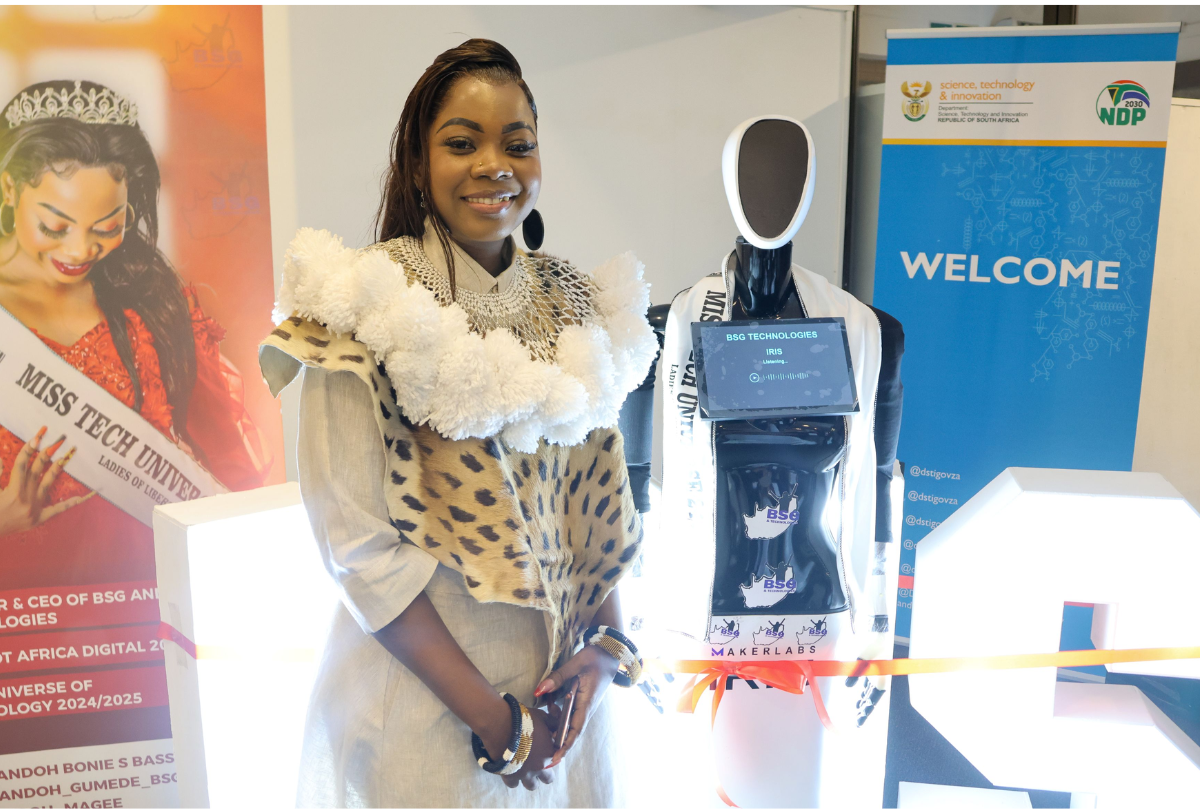South Africa Unveils First AI-Powered Robot Tutor, Iris, to Transform Education

When innovation, women’s empowerment and technological advancement join forces the result is profound – and that describes South Africa’s first artificial intelligence (AI)-powered robot tutor, which was launched on Tuesday 19 August 2025. Hosted by the Deputy Minister of Science, Technology and Innovation, Ms Nomalungelo Gina, at the Durban Royal Golf Club, the launch highlighted both the transformative potential of AI in education and the critical role of women in driving the fourth industrial revolution.
The robot named Iris was conceptualised by KwaZulu-Natal-born innovator, Ms Thando Gumede, and developed by her company BSG Technologies. It is a pioneering educational robot capable of teaching subjects across multiple levels – from grade R to tertiary education – in all 11 official South African languages. This multilingual capability positions Iris as a uniquely African solution to long-standing challenges in access, equity and inclusivity within the education sector.
IRIS leverages advanced natural language processing, emotional recognition and adaptive learning algorithms to engage students in interactive, personalised lessons. Its ability to operate in indigenous languages ensures that linguistic diversity becomes an asset – not a barrier – to learning.
The Deputy Minister hailed Iris as a landmark achievement in South Africa’s journey toward technological sovereignty.
“This is not just a robot, it is a symbol of what our nation can achieve when we invest in homegrown talent, particularly the brilliance of African women. We must be the architects of our own digital future. Intra-African collaboration, investment in local innovation and creating ecosystems where ideas like IRIS can thrive – these are the building blocks of a self-reliant, knowledge-driven continent.”
– Ms Nomalungelo Gina, Deputy Minister of Science, Technology and Innovation, SA
Ms Gina highlighted the importance of women’s participation in science, technology, engineering and mathematics (STEM). As South Africa celebrates national Women’s Month, she reminded the audience that innovation has no gender, race or geographic boundary.
“Science does not discriminate, but society sometimes does. This is why we must actively create space for women to lead in AI, robotics and every frontier of innovation. The economy of tomorrow will be built on digital skills, and women must be at the centre of that transformation.”
– Ms Nomalungelo Gina, Deputy Minister of Science, Technology and Innovation, SA
Addressing concerns about AI displacing educators, Mr Mbongiseni Mazibuko, Deputy Director-General: Curriculum Management and Delivery at the Department of Basic Education, clarified that Iris is not designed to replace teachers, but to empower them.
“Technology is not our competitor; it is our collaborator. Iris will be part of the classroom ecosystem, supporting teachers, personalising learning, and bridging gaps in resource-strapped schools. Our department is committed to upskilling educators so they can confidently integrate AI tools like IRIS into their teaching practice. Iris was built by a South African woman, for South African learners. That fact alone makes this a national milestone.”
– Mr Mbongiseni Mazibuko, Deputy Director-General: Curriculum Management and Delivery, SA
He praised Ms Gumede’s innovation as a testament to what’s possible when young black women are supported in STEM.
“My dream is to see Iris in every classroom across South Africa, especially in rural and under-resourced communities where qualified teachers and learning materials are scarce. We’re setting up our plants, acquiring equipment and preparing for mass deployment. The goal is to make Iris affordable, accessible and adaptable to every learner’s needs.”
– Ms Thando Gumede, Innovator and Founder, BSG Technologies
The launch event featured a live demonstration of Iris in action, which captured the attention of both learners and educators. Suhani Singh, a grade 9 student from Reddam House Ballito, expressed her excitement, saying that the launch had been incredible. She explained that although she had used AI tools before, witnessing a robot teach in both Zulu and English was inspiring. According to her, Iris did not replace thinking but rather expanded what students could do.
Other students praised the robot’s responsiveness and ability to explain complex concepts in simple terms, suggesting that AI could help reduce educational inequalities.
While Iris has a way to go before being rolled out in classrooms nationwide, its debut marks a turning point in South Africa’s educational landscape. With strong government backing, private sector interest and a clear mission rooted in equity and innovation, Iris could soon transition from prototype to policy.






